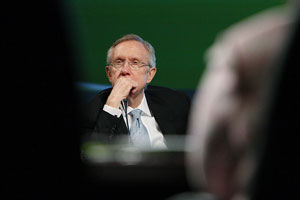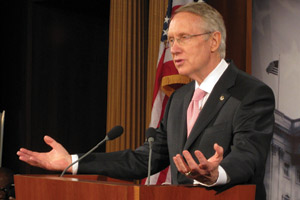
Photo by flickr user <a href="http://www.flickr.com/photos/americanprogressaction/3821293202/">Center for American Progress Action Fund</a> used under a <a href="http://www.creativecommons.org">Creative Commons</a> license.
Conventional wisdom, as personified by the Washington Post‘s Chris Cillizza, says Harry Reid (D-Nev.), the senate majority leader, has to be careful about appearing too liberal lest he anger his state’s “conservative-minded voters.” Lefty conventional wisdom says exactly the opposite, arguing that Harry Reid is unpopular with Nevadans (who went for Obama by 12 points) because he’s not liberal enough. “We Have Leverage On Harry Reid,” OpenLeft’s Chris Bowers assured readers late last month. That’s one reason the Progressive Change Campaign Committee is now running ads in Nevada urging Reid to force through a health care bill with a public option—or face the left’s wrath. The Las Vegas Sun‘s J. Patrick Coolican explains why Cillizza could be wrong and the left could be, well, right:
Nevada was once a conservative state, and that’s when the Daschle analogy would have made sense. But Cillizza glosses over the single most significant fact of Nevada’s recent political history: Obama’s crushing 12.5-percentage-point victory here last year.
Cillizza: “While Obama carried the state by 12 points in 2008, George W. Bush won it — albeit narrowly — in 2004 and, aside from Clark County (Las Vegas), the state is populated with conservative-minded voters who are more likely to disagree than agree with the direction that Obama (and Congressional Democrats) are taking the country.”
The key phrase here is “aside from Clark County.” Well, that’s 70 percent of the state’s population. And most of the state’s Democrats.
It’s like saying Utah is secular, aside from the Mormons.
Fair enough. But none of that proves that a significant portion of Nevadan Reid-haters disapprove of him because they think he isn’t bold enough or liberal enough. Thankfully, this problem is easily solved. The Daily Kos/Research 2000 polling operation last polled Nevada at the end of August (well, 8/31-9/2). When they poll the state again, Markos should consider spending some extra dough to prove that liberals are right about Harry Reid and the Cillizza CW is wrong. Then we’ll have a better sense of what’s really going on—and Sen. Reid will have some guidance, too.














